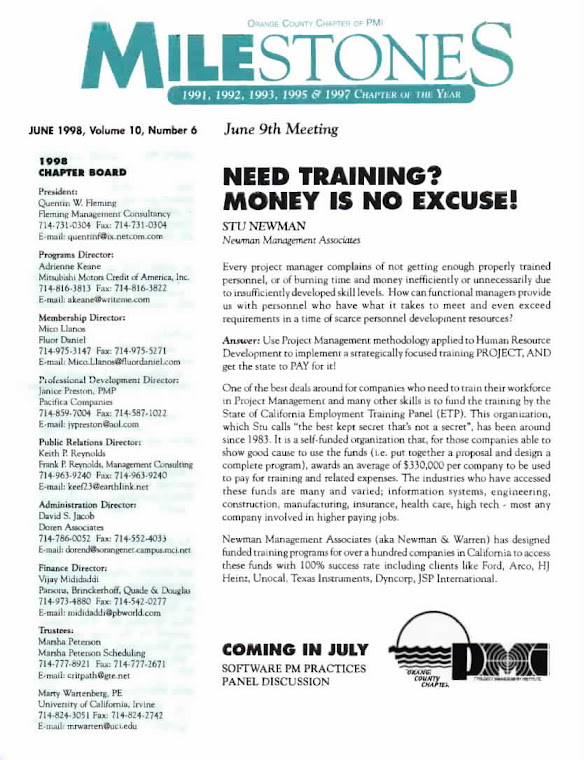Everyone agrees that delivering projects on-time, on budget, and meeting performance requirements (the "triple constraints") are critical to consistently successful project management. Additionally, the following leadership/management attributes provide a solid foundation for achieving great PM success. (I make no claim to originality for most of these - many you can find in a couple minutes of internet surfing).
Increasingly the business world is becoming more project based, largely driven by an organizations need to be competitive and profitable - therefore the skills and attributes necessary to achieve PM success are becoming more valuable. These skills are far more valuable (and harder to develop) than any business project management software. If you lack any of them, take time to foster and hone them - for yourself and those around you.• Foresight; being able to look down the road and make some reasonable predictions based upon practical assumptions. I call it the converse of planning.
• Organization; keeping information, schedules, and team members organized is critical. Being detail-oriented, but without micro-managing is key.
• The ability to lead. Although there are some people who are natural leaders, basic leadership skills can be learned, practiced, and improved. It's not well covererd in the PMBOK, but there are mentors, leadership training, assessments, and books you can read if an honest evaluation of your leadership skills finds you lacking. Leadership and people skills are, IMHO, more important than methodology and tracking tools.
• Communication skills. It's important to be able to communicate with everyone involved in the project from peers, to team members, and stakeholders. Everyone needs different information couched in different terms, at different detail levels, at different times. Many seasoned practitioners will say they spend more time in communication than any other single PM activity.
• Pragmatism. A pragmatic approach to problem-solving is a skill that is essential for a discipline as varied and mult-functional as project management.
• Empathy and Situational Leadership. In order to lead people, you need to understand them and what motivates them. Everyone is different and a one-size-fits-all approach to leadership is seldom the most successful approach.
• Delegation. You can't do it all yourself, and most of the time, if you have the right people, the task can be done better by someone else. Besides, if your always doing it you rob others of growth and can't invest in the organization's future. Great project managers understand that successfully leading people is more than half the battle in managing any complex or large project.
• Pro-Active and Following Up. Even the best folks need some follow up and reminders now and then, and you can never sit back and wait for stuff to happen on its own.



